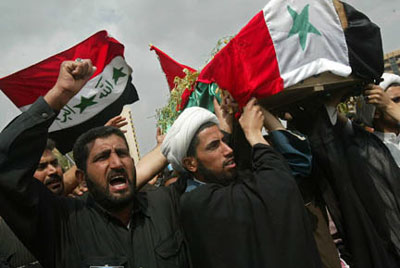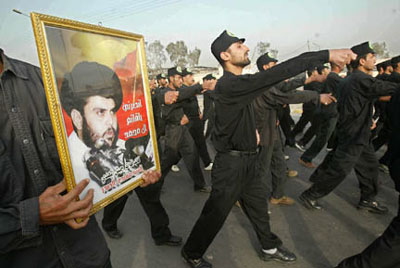It was the third day of the Shiite uprising in the south and the militiamen of Moktada al-Sadr had just taken control of the town of Kufa outside of Najaf in Iraq. I was sent with a reporter and five Iraqis including a translator, two drivers and two security guards, to cover the events. We knew that security in the town was mediocre at best so we pulled over just outside of the city to phone our stringer for an update.
 |
Supporters of Moqtada al Sadr, 4 April 2004. Photo by Shawn Baldwin - Reflex News |
Within a couple of minutes, at least two cars stopped alongside ours and we were enveloped by about a dozen militiamen, all in their 20's-40's. Most were dressed in black, the choice color of the Madhi Army, but a few wore plain clothes. Their weapons were not drawn but they held them in their hands, fingers on the triggers, in that careless militia way.
At first things seemed fine and we were trying to be as friendly as possible. I asked one of the guys if I could photograph them 'Sora' but he just shook his head. Our translator spoke to the men in Arabic explaining to them that we were 'Sahafi' or 'journalists' but they didn't seem very interested.
After a few minutes, our translator told us to get back into our cars and that we would be taken to the mosque in the center of town to be checked out. The men put us in our cars and with weapons in hand watched us closely during the brief ride. The militia had set up checkpoints inside of the town and had obviously overrun the police station and seized the police cars. The town seemed fairly tense, most of the shops were boarded up and few people outside of the militia were milling about in the streets.
Once we were dropped off outside of the gold domed Kufa mosque I figured this could be my only chance to make any pictures so I tried to bang off a couple of frames but I think one of the militia guys caught me and within a minute they took my cameras away.
We spent the next hour outside of the mosque where they thoroughly searched our car, taking all of our possessions including our press Ids, cameras and Kevlar vests. Outside of the mosque were hundreds of men toting Kalashnikov rifles, rocket-propelled grenades, bayonets and knives. Some of the men were in their 50's-60's but a good many seemed to be as young as 12 or 13 years old. Many had checkered kuffiya headscarfs and wore pictures of the 31-year-old cleric Moktada Sadr.
 |
Members of the Mehdi Army, in Sadr City 3 April 2004 Photo by Shawn Baldwin - Reflex News |
They seemed to be expecting an attack by the Americans and obviously thought we were some sort of spies. At one point an ambulance drove up to the gates of the mosque and dropped off medical supplies. As we watched dozens of pilgrims, many Iranian, making their way in and out of the mosque, a bearded man we had seen earlier walked through the gate towards us. Alongside him were three men with their faces covered, toting automatic rifles. They told us to make our may back to our vehicles.
I slid into the back seat. Someone had a blindfold and put it over my eyes. Our captors told us we were going to meet someone and there seemed little we could do to argue. The drive seemed to go on forever as we were driven for over an hour along dirt roads. We didn't know it at the time but we later found out through our translator that with guns placed against our heads our bearded driver told his men that 'if anyone moves kill them'.
About dusk we were told we could remove our blindfolds and it seemed fairly evident that our captors had gotten lost. We had ended up in a semi-desert rural area with a scattering of houses. With a little help from the locals the driver managed to find the correct road and we were dropped off outside a farmhouse where our few remaining possessions were taken from us.
The seven of us spent the next six hours in a windowless one-room cinderblock building guarded by at least five very nervous security guards. We were allowed to speak but did so only in whispers and sat on the floor covered with Arabic carpets. The men outside were masked and armed.
With little to do most of us slept for a few hours here and there and at one anxious moment we could hear the sound of a predator drone, the type used by the U.S. military, fly overhead. Fearing this could be a really bad time for a US attack the sound of the drone eventually faded away much to our relief.
We were woken around midnight by the sound of our vehicle pulling up to the farmhouse. A man entered the room telling us we were free to go home and that it had all been a mistake.
Our captors then drove us back to the shrine to collect our equipment. We spent a few minutes contemplating what we should do for the night but decided that our best course of action was to jump on the highway and take our chances with the bandits on the road fearing the militia men might change their minds in the middle of the night and come look for us if we stayed in the area.
We didn't have any trouble with the bandits, but we were delayed the following day by American Forces as they searched the highway for a possible Improvised Explosive Device, a common weapons used by the insurgents. A few minutes later the U.S. convoy, and us by default, took mortar fire and small arms fire about 100 yards west of the highway.
About an hour later as we drove into the town of Mahmodia, we saw and heard what sounded like RPG explosions go off in the city. With U.S. humvees racing past us we decided to circumvent the troubled area.
Finally, our 30-hour day trip ended in the relative safety of Baghdad
Shawn Baldwin is a freelance photojournalist based in New York whose work has appeared in Time, Newsweek, The New York Times, The Guardian and various news publications.

